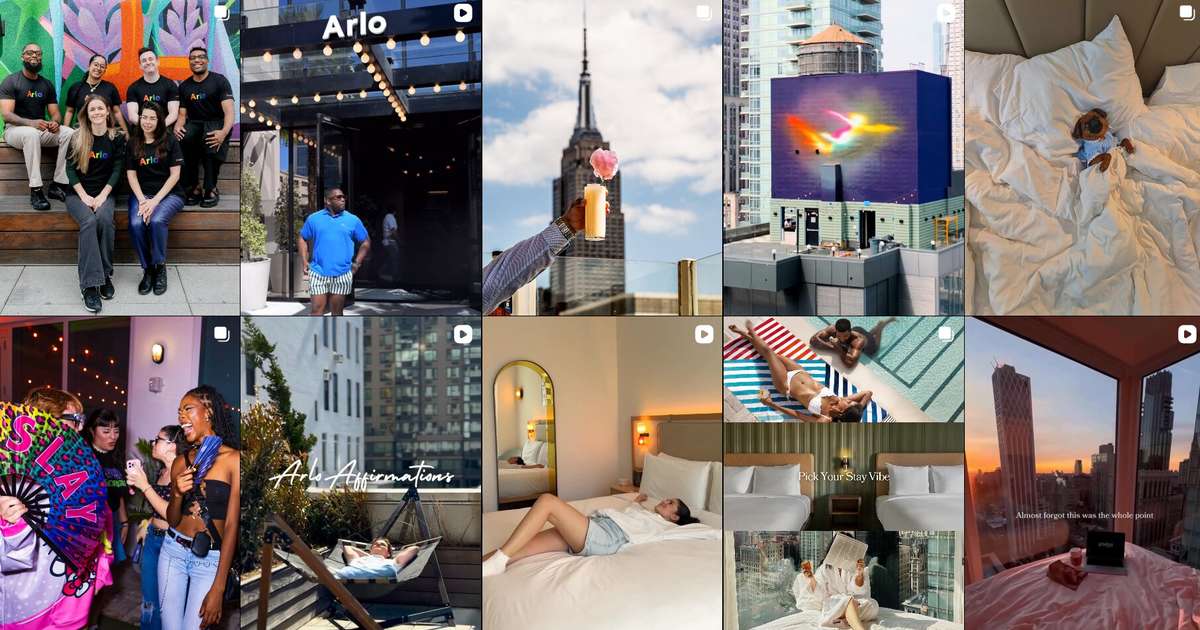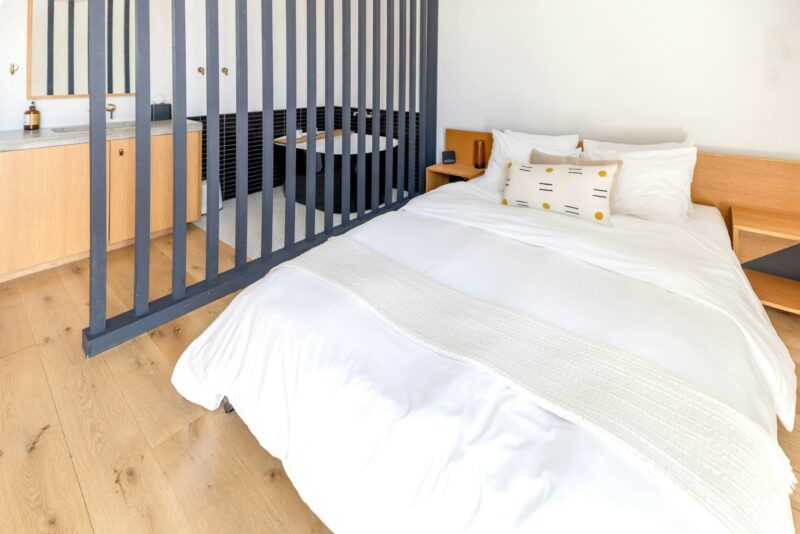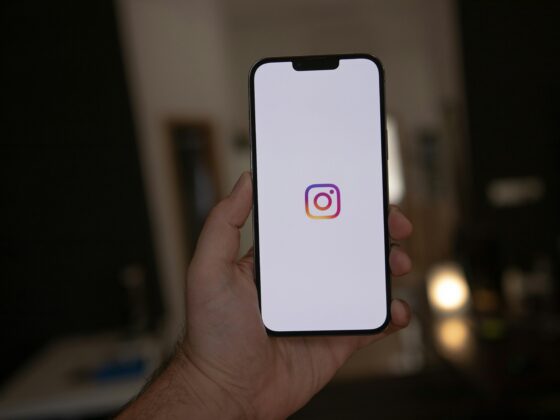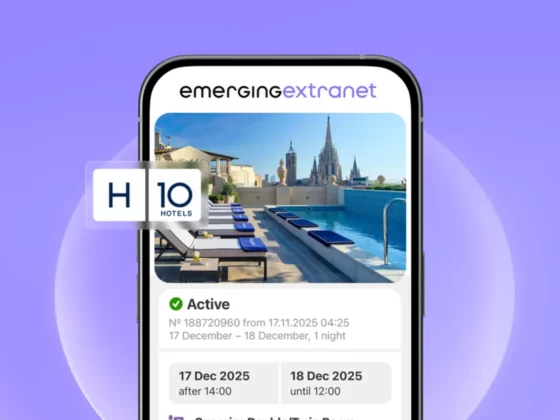
I had the opportunity to sit down with Dino Jevric, Social Media Manager at Arlo Hotels, to discuss how the brand is taking a different path on Instagram at a time when many hotels still use social mainly to push rates and packages. Arlo is treating the platform less like a sales channel and more like an extension of the guest experience, curating its feed as a living diary of hotel life and neighbourhood energy. The aim is simple but ambitious: make people feel like they are already there, before they have even booked.
Jevric describes culture as the engine of digital relevance and says Arlo has made that mindset part of its DNA. The brand intentionally leans into real time cultural moments and playful storytelling formats, but always with a filter of authenticity. The goal is to participate in what people care about right now, while still sounding and feeling unmistakably Arlo.
This approach is built around relatability. Instead of polished ad style content, Arlo relies heavily on user and employee generated stories, letting guests, chefs, property teams, and locals tell the brand narrative from their own perspective. Episodic series such as Behind the Apron and Know the Neighborhood deepen that connection by introducing the people behind the restaurants and spotlighting neighbourhood creatives, creating content that audiences want to save, share, and return to.
The results over the past year are telling. Arlo added around 33,000 new Instagram followers and increased engagement by roughly 50 percent, driven by storytelling that prioritises emotion over promotion. Campaigns like Sweater Weather show how the brand can still attach a commercial offer to a universal seasonal feeling without breaking the tone of the feed. In the interview that follows, Jevric explains how this culture led strategy is shaped day to day, how the team measures meaningful engagement, and what hospitality brands can learn from treating social media as community first storytelling with real business impact.
Here is my conversation with Dino Jevric on how Arlo builds culture led storytelling, measures real connection, and turns social media into a genuine extension of the guest experience.
From Promotion to Emotion
Arlo’s social presence feels more like a journal than a marketing feed. What inspired this shift from promotional content to emotional storytelling, and how did you convince internal stakeholders that this would drive stronger brand results?
At Arlo, our mission has always been to share the real, human experience people have when they encounter our hotels. We’re not just selling rooms – we’re selling a feeling, and our social feed wasn’t fully capturing that. As a brand focused on building culture, connection, and constant activation, I realized the promotional lens alone was flattening who we are. Shifting to emotional storytelling brought the heart of the brand back into focus and allowed us to highlight the moments that make Arlo feel alive. Ultimately, it became clear that storytelling wasn’t a risk – it was an evolution.
Culture as a Living Strategy
You’ve said that “culture drives digital media.” How do you identify which cultural moments Arlo should authentically join — and where do you draw the line to ensure participation still feels genuine rather than opportunistic?
When it comes to representing a brand on social media, the real game happens off of the playing field. Culture shapes how people think, feel, and behave, so we stay plugged into what our audiences are naturally engaging with but we only participate when there’s a clear and authentic connection back to the Arlo experience. A great example was the Labubu craze earlier this year; instead of forcing a trend, I tapped into it in a way that made sense for us by creating a “day in the life” from the POV of a Labubu staying at Arlo. It felt playful, on-brand, and organic. The line gets drawn when a moment doesn’t naturally intersect with our values, our communities, or the story we can tell – if it feels opportunistic, we sit it out.
The Power of Perspective
Arlo’s feed often feels like it’s told by the community rather than about it — from chefs and property teams to local creatives. What systems or principles do you use to empower these voices while maintaining a cohesive brand narrative?
A big part of our strategy is giving our community the space to help tell the Arlo story rather than positioning them as supporting characters. One way we’ve done that is through our Behind the Doors series, which intentionally breaks the fourth wall and brings people into the moments that shape our properties – from kitchen creativity with our chefs to interactions with our guest experience teams. By creating structured formats like this, we’re able to spotlight individual voices while still maintaining a unified narrative. It keeps the content human, consistent, and connected to the core Arlo experience.
Measuring Meaning
You’ve mentioned valuing “saves, shares, and revisits” over traditional vanity metrics. How does Arlo translate these engagement signals into tangible business outcomes, and how do you balance creative freedom with measurable ROI?
I prioritize saves, shares, and revisits because they tell us when content actually mattered to someone, not just landed in their feed. We tie these behaviors directly to spikes in booking-page traffic, If You Arlo code usage, and reservation bumps. That lets us understand which creative actually drives revenue. I balance creative freedom with ROI by giving myself room to experiment while anchoring everything to clear goals and performance indicators.
Employee-Generated Storytelling
Employee-generated content seems to play a growing role in Arlo’s identity. How do you encourage staff participation and creativity without making it feel like a corporate directive?
Our staff is at the core of our initiatives, so employee-generated content becomes a natural extension of who we are. We make the process easy and collaborative by sharing the concept, showing examples, and letting their personalities drive the moment. Highlighting them across our channels builds pride and creates a ripple effect where others want to be involved. It’s become part of our culture to spotlight the people who make the guest experience what it is.
The Future of Hospitality Marketing
As the hospitality industry redefines digital connection, what do you think the next chapter of hotel storytelling will look like — and how might brands that still rely on polished promotion risk being left behind?
The future of hotel storytelling will be defined by perspective, not polish. These are stories that show how a place feels through the people who bring it to life. Digital connection is shifting toward honesty, nuance, and the texture of real moments, not the airbrushed version of hospitality. Brands that cling to overly produced promotion risk losing relevance because they’re speaking a language today’s audience no longer responds to. I believe the hotels that will lead the next era are the ones willing to look closer, ask better questions, and share the kinds of moments that can’t be staged.







